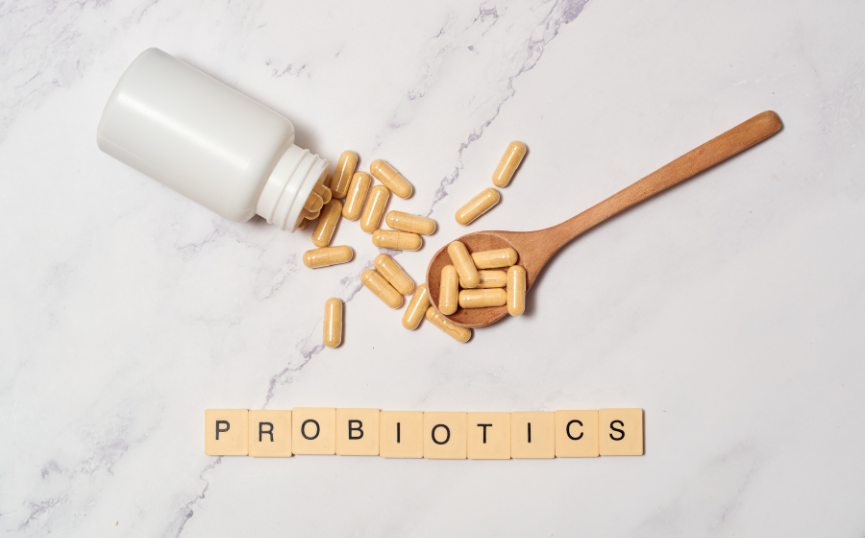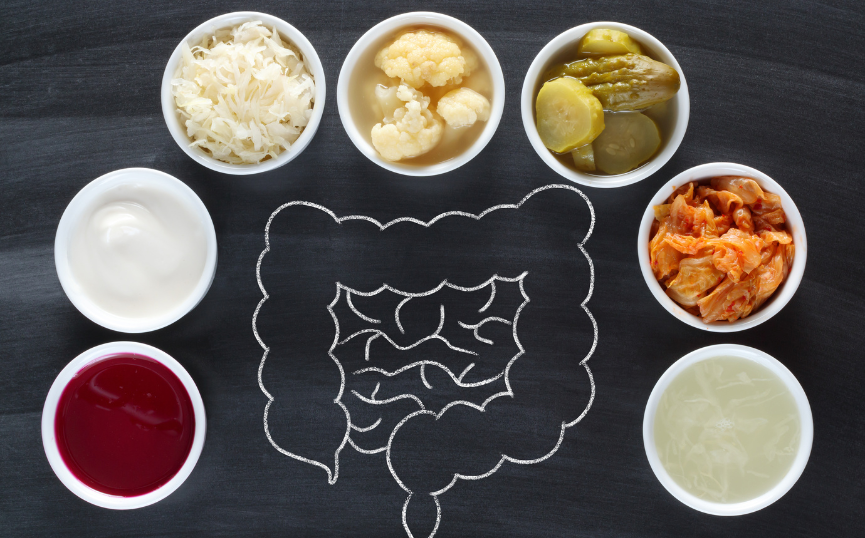Probiotics factsheet - learn more about the beneficial microorganisms in your body
Probiotics, tiny little microorganisms. Bacteria that have so many effects on the body. Did you ever think that taking probiotics could reduce the risk of getting infections or boost your mental performance? And did you know that probiotics can even boost testosterone?

WHAT IS GUT FLORA?
To understand the effects of probiotics, we first need to understand the concept of gut flora.
No one needs to be told that energy is needed for every single process in our body. And energy for our body comes from food we ingest from an external source. We also have stored reserves, but if we don't eat for a long time, these are depleted.
To be used, food from an external source has to be digested by the digestive system.
The digestive system consists of the oral cavity, oesophagus, stomach and intestinal tract. The digestion of food starts in the oral cavity, as saliva also contains enzymes responsible for breaking down nutrients. Once in the stomach, the highly acidic environment dissolves the nutrient and it is then passed to the intestinal tract where nutrient utilisation begins.
The intestinal system should be thought of as the car's assembly line, breaking down the incoming vehicle (this is the food) into its constituents (in our bodies, stomach acid and digestive enzymes are responsible for this) and retaining the necessary constituents (this is what the intestinal system does, in the process of excretion).
Our gut contains billions of tiny bacteria. This is commonly called the gut flora. The balance of which is critical to support.
Therefore, to support the gut flora, we offer probiotic preparations containing the bacteria of the gut flora in capsule or solution form. Probiotics help proper digestion, support proper immune and brain function and protect against infections.
It's important to know that it's not just our guts that have microorganisms, but also our throat, vagina, urethra, ear canal, skin and many other places.1-4 So the bacterial flora in general, throughout our bodies, is important to keep in balance.
WHAT IS THIS BALANCE?
Intestinal bacteria have a number of effects, fermenting fibres that cannot be broken down by stomach acid.5 Fermentation produces short-chain fatty acids that are used by muscle, colon and liver.5 So gut bacteria and fibre provide nutrients to the muscles, colon and liver, stimulating their function. In addition, gut bacteria break down bile acids and can also produce vitamins B and K.6,7 All these effects are due to the "good" gut bacteria.
However, there are also harmful bacteria that can live and develop infections in our bodies. These 'bad' bacteria provide a breeding ground for many diseases.
Therefore, it is very important to have sufficient amounts of 'good' gut bacteria, i.e. a balanced gut flora. If we have the right amount of beneficial micro-organisms in our body, our gut flora will be balanced.
Think of the relationship between 'good' and 'bad' bacteria as a piece of land that you want to use for agricultural purposes, so you want to plant on it. The whole piece of land is our gut. The "good" germs are the seeds to plant, let's say we really like corn, so we plant corn kernels. If there are not enough seeds to plant ("good" germs), what happens? Weeds and weeds will dominate our soil (our gut). These weeds and weeds are the "bad bacteria". So the "good" bacteria take the place of the "bad" germs. They also protect us from various infections, which is what we call the "barrier" function of the gut flora.8-10
It is also important to add that the right flora not only acts as a "barrier" in the intestinal tract, but can also protect the throat, urinary tract and vagina from infections.10-14 This is why probiotic vaginal suppositories are available.
Extra tip: Some experts believe that our gut flora is so unique that it could even replace fingerprint identification.
PROBIOTICS AND DIGESTIVE PROBLEMS
One of the most basic effects of probiotics is that they help digestion, which is why most people use them.
If your gut flora is not right, the fibre you eat cannot be digested at all, and this can lead to two things. Because fibre binds water, if we drink enough during the day our stools become too watery and we can get diarrhoea.37,38
If we drink too little and have nothing to throw up the stool, the fibre will be absorbed. This can lead to constipation.
For these reasons, stomach problems can occur from taking antibiotics. Diarrhoea is most common, but constipation can also occur. 36
Also, there will be no substance to break down the bile produced, so nausea and bilious vomiting may be common.
To treat these problems, the use of a probiotic is definitely recommended, and during or after a course of antibiotics, the use of an appropriate probiotic supplement would be critical. 36-40
Furthermore, as gut flora affects the immune system and thus inflammatory processes - both of which are pushed towards a healthy, balanced state - probiotic supplementation can also improve inflammatory digestive diseases such as peptic ulcers, enteritis and IBS (irritable bowel syndrome). 23-31
While there is strong evidence for the beneficial effects of probiotics in the aforementioned diseases, the literature is mixed on ulcerative colitis and Crohn's disease, which are also inflammatory diseases of the intestinal tract.32-34
Probiotics exert their protective properties on the digestive tract, not only by acting on the immune system and inflammation, but also by helping to mucus the walls of the gut and stomach, thereby strengthening the protective walls of the stomach and intestinal cells.35
Furthermore, in many cases such diseases start with a bacterial infection, for which the first line of treatment is the use of antibiotics, which do not sort out the good bacteria, killing them, so in such cases taking probiotics may be even more justified.

PROBIOTICS AND THE IMMUNE SYSTEM
The effect of gut flora on the immune system has been demonstrated in a very interesting way. Animals were raised in a completely sterile environment, without any contact with living organisms. The immune system of such animals did not function properly. So our immune system has to be in contact with the gut flora back there. This means that the immune cells need to recognise the good bacteria. This triggers a low level of inflammation (called natural inflammation) in the body, which strengthens the immune system and once harmful infections enter the body, the immune system is able to fight them more effectively.15 This goes some way to supporting the "what doesn't kill you makes you stronger" principle.
Furthermore, good bacteria produce substances that also help fight infections, further strengthening the immune system.
So consequently, as soon as we are born, our gut is completely sterile, with no micro-organisms in it. As we come into contact with the outside world, more and more bacteria and tiny microscopic organisms enter our bodies.16
Remember what our grandparents used to say about always eating small amounts of dirt? How right they were...
The link between the immune system and probiotic consumption has been confirmed by numerous animal and clinical studies. Many studies confirm that probiotics stimulate the production of IgA antibodies responsible for recognising infection, help the process of immune cell engulfment and the function of helper T-helper cells, which present molecular fragments of infections to cells that recognise them (carrying antibodies).17-20
To understand the foregoing, imagine a virus with an ordinal number (a molecular fragment, the identifier of the virus, also known as an epitope or antigenic determinant), this ordinal number is recognised by police (immune cells that also recognise these antigen-recognising antibodies such as IgA), recognition is assisted by T-helper cells. If recognition is successful, an inflammatory process is triggered, by which the immune cells destroy the invaders, either by free radicals or by engulfment.
So, from this you can see that probiotics not only take the place of infections, but also directly stimulate the immune system. But how can the bacteria in our gut affect cells in the body far away?
Researchers don't know the specific explanation, but it is thought that the 'good' bacteria in the gut flora produce proteins that act like hormones on immune cells.21,22

PROBIOTICS AND THE NERVOUS SYSTEM
In addition, there is a growing body of research that shows that gut flora is also linked to the brain.
To prove this, how happy can we be from a meal? Appetite and digestion are influenced by a number of hormones that also affect our brain.
The link between the gut and the nervous system was first reported in research known as the Pavlov reflex. When dogs were given food after ringing a bell, the sight of which triggered their saliva production. After a few repetitions of the bell and then the feeding, the dogs responded to the bell simply by salivating, without the presence of food. 42
The gut flora has a specific link to the nervous system. Research has shown that the link goes both ways, the brain sends signals to the gut, but the gut can also send signals to the brain.
Studies have shown that animals without gut flora had increased levels of cortisol (stress hormone), had learning difficulties and also had reduced muscle mass. 41
Several studies confirm that restoring gut flora, i.e. taking probiotics, can also improve mental illnesses such as depression, schizophrenia and autism.43-47 These are supported by the fact that the nervous system is also controlled by hormones and a healthy digestive system is associated with a healthy hormonal system.48-51
In an interesting study, taking probiotics improved participants' moods and the quality of their sleep.52
And one study found that participants' mental53 and physical54 performance also increased after a probiotic regimen. The literature is mixed on the effect on physical performance, but mentally, there is strong evidence that taking probiotics can help.
PROBIOTICS AND THE CARDIOVASCULAR SYSTEM
There is growing evidence that probiotics can reduce risk factors for cardiovascular disease, such as high blood pressure, blood glucose, total cholesterol, LDL and HDL ("good" and "bad") cholesterol ratios and inflammation. 55-58
Inappropriate lifestyle (poor dietary habits, obesity, excessive alcohol consumption and cigarette smoking, and excessive stress). These risk factors increase the risk of diabetes, heart attack and stroke. It is therefore critical to reduce these risk factors.
PROBIOTICS AND TESTOSTERONE
Finally, I would like to tell you about a really interesting study that broadens our understanding of the effects of probiotics.
Animal experiments have shown that animals taking probiotics have increased testosterone-producing Leydig cells and, at the same time, sperm cells. The researchers attribute these effects to the general anti-inflammatory effects of probiotics.59
HOW SHOULD I TAKE PROBIOTICS?
For preventive purposes, probiotics should be used intermittently. Use one box every year or every 6 months.
If you have a medical condition for which probiotic consumption may improve, you should take them as prescribed by your doctor.
And always use probiotic preparations during a course of antibiotics.
Probiotics should be used in combination with prebiotics. Prebiotics provide nutrients for the 'good' bacteria, such as fibre. Just think what is the point of growing bacteria without feeding?
Pro-tip: Of all the probiotic supplements, you should choose cellulose capsules, as cellulose, a fibre that is indigestible to our bodies. This way, we do not expose our bacteria to the damaging effects of stomach acid, but they are able to exert their beneficial effects directly in the intestinal tract.
Choose from our range of probiotic, prebiotic and synbiotic (containing both) supplements!
SIDE EFFECTS OF PROBIOTICS
Probiotic consumption is considered safe and side effects are rare. Most side effects have been reported in individuals with chronic diseases (pancreatitis, heart disease).
Therefore, whatever the disease, we should always use probiotic preparations after consulting a doctor, as our doctor knows our medical history and will make the best recommendation for us according to his/her knowledge.
Case reports have been reported of bacterial and fungal infections and inflammation of the pericardium.60-63



